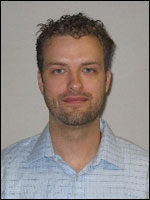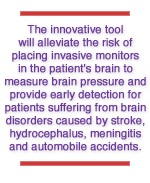|
|
|||||
|
|
Tepper Grad's Startup to Commercialize Noninvasive Medical Diagnostic Device for Brain Disorders and Injuries
McChesney's business plan named a semifinalist in FORTUNE Small Business magazine's Student Showdown
McChesney should know if it's a good idea or not. In addition to earning his MBA this past May, the fledgling entrepreneur is a 2002 graduate of the University of Pittsburgh Medical School. He was formerly a researcher at the National Institutes of Health and has also worked at multiple medical diagnostic startup companies.
Business experts think McChesney's idea is a good one, too. NeuroLife, the company McChesney founded to develop and commercialize the device, is one of 11 semifinalists in FORTUNE Small Business magazine's Student Showdown, a national business plan competition for b-school students. McChesney won the Idea Foundry Business Plan Competition among Tepper School students earlier this year.
He recently presented NeuroLife to a FORTUNE magazine panel of judges, including venture capitalists and entrepreneurs, via teleconference. Five finalists will be announced in September.
"We're currently developing a prototype. The goal is to make it an automated, hand-held device that could fit into a compact bag," says McChesney who earned his bachelor's degree in biochemistry at Rutgers University in 1997.
McChesney is pursing funding from the National Institutes of Health, the Pittsburgh Lifesciences Greenhouse, private investors and the U.S. Army, which sees the device as a valuable tool for soldiers who sustain head injuries in the battlefield.
More than 80 teams from 66 business schools entered the FORTUNE competition. The winning entry will receive a $35,000 cash prize from sponsor SAP, the world's leading provider of business management software. The runner-up will receive $10,000 and $5,000 will go to the third-place entry.
Bruce Gerson |
|||
|
Carnegie Mellon Home |
|||||

 McChesney says the innovative tool will alleviate the risk of placing invasive monitors in the patient's brain to measure brain pressure and provide early detection for patients suffering from brain disorders caused by stroke, hydrocephalus, meningitis and automobile accidents.
McChesney says the innovative tool will alleviate the risk of placing invasive monitors in the patient's brain to measure brain pressure and provide early detection for patients suffering from brain disorders caused by stroke, hydrocephalus, meningitis and automobile accidents.